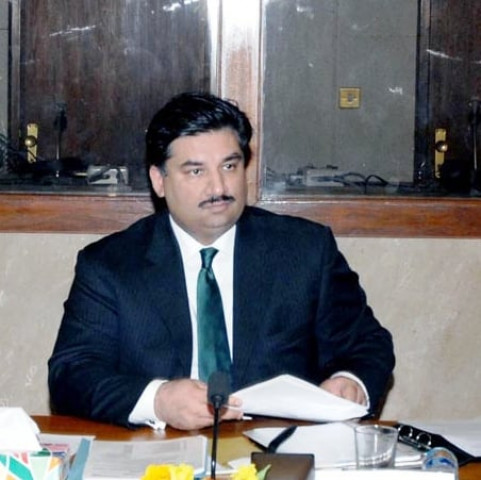Business with neighbours: Minister asks for access to Indian markets
Khurram Dastagir Khan indicates that trade liberalisation through the land route will happen before MFN is granted.

Federal Minister Khurram Dastagir Khan. PHOTO: SANA/FILE
Newly sworn-in Federal Minister Khurram Dastagir Khan has said that granting most favoured nation (MFN) status treatment to India is “not too far” and access to markets is what matters most, not nomenclature.
“The main idea is to get more market access. It does not matter what nomenclature is used,” he said, adding that both sides are slowly gaining market access in each other’s countries.
Khurram Dastagir is in India to take part in the Saarc Business Conclave, besides holding talks with his Indian counterpart Anand Sharma on Saturday.
The minister’s address comes at a time when trade talks between the two countries have become a victim to escalation of tension on borders. The talks have seen a pause since early 2013 following tension on the Line of Control.
Economist and trade expert Rajiv Kumar said: “In the absence of a move from Pakistan, India should make unilateral trade concessions to Pakistan.”
“India should seriously consider giving unilateral access to Pakistan and prune its negative list without waiting for the MFN status. India has a huge surplus in its formal bilateral trade,” Kumar said.

He added that India’s unilateral grant of better market access will not materially harm India’s interests. “On the other hand, it could provide a real fillip to Pakistani exports to India and thereby contribute to improving its economic performance.”
Pakistan has already missed the deadline of granting MFN status to India. In December 2012, Islamabad liquidated the negative list of 1,209 items. The list contained 1,209 items that India cannot export to Pakistan, including pharmaceutical and agricultural products. India can now export around 7,500 items to its neighbour, up from 1,946 earlier. The positive list contained vegetables, meat products, animals, fruits, tea, spices, palm oil, crude oil, sugar, cotton and organic chemicals, among others.
The minister, however, pointed out as far as giving market access in agriculture is concerned, there are sensitivities attached to it. “We take sensitivities on our agriculture sector very seriously. This is a tough issue and we need to respect each other’s sensitivities.”
On the issue of allowing more goods to be traded through Wagah-Attari border, he said it is under “active negotiation and the discussion is in progress.” He even hinted that trade liberalisation through the land route will happen before MFN.
Khurram Dastgir Khan, who is on his second tour of India, said the greatest non-tariff barrier right now is the visa regime, urging it to be relaxed immediately.
India and Pakistan had set a target of $6 billion bilateral trade by 2014. In 2012-13, trade between the two nations stood at $2.5 billion. According to Sunil Kant Munjal of Hero MotoCorp, who is also the co-chair of Pakistan India Joint Business Forum (PIJBF), bilateral trade might reach $10 billion in the next five years.
Next month, the ‘Made in India’ show is taking place in Lahore. Besides, the third round of Pakistan India Joint Business Forum (PIJBF) will take place on February 18 and 19 in Pakistan.
Published in The Express Tribune, January 17th, 2014.



















COMMENTS
Comments are moderated and generally will be posted if they are on-topic and not abusive.
For more information, please see our Comments FAQ